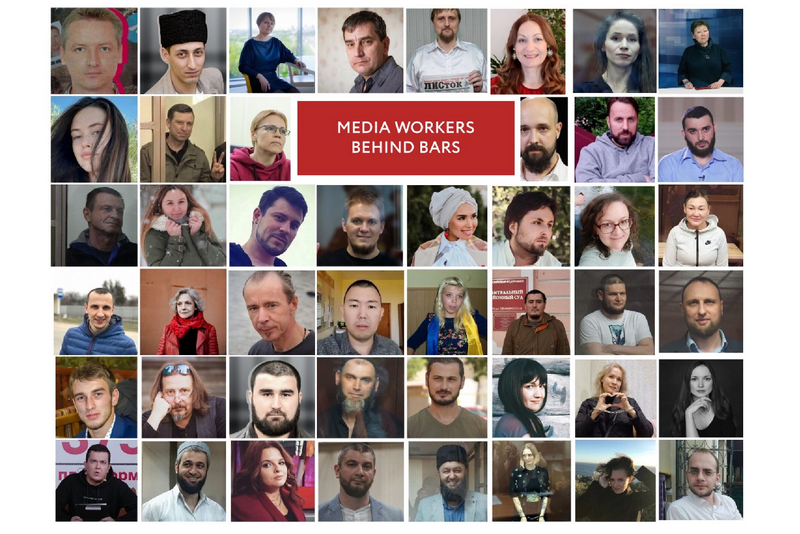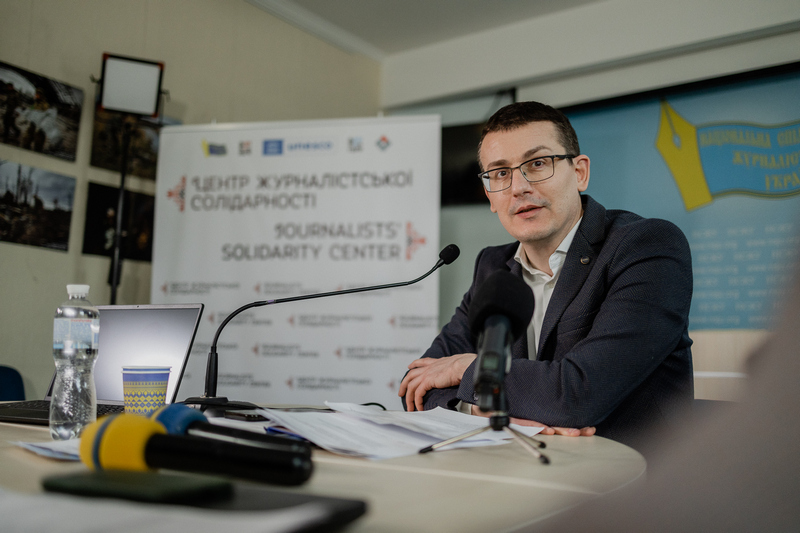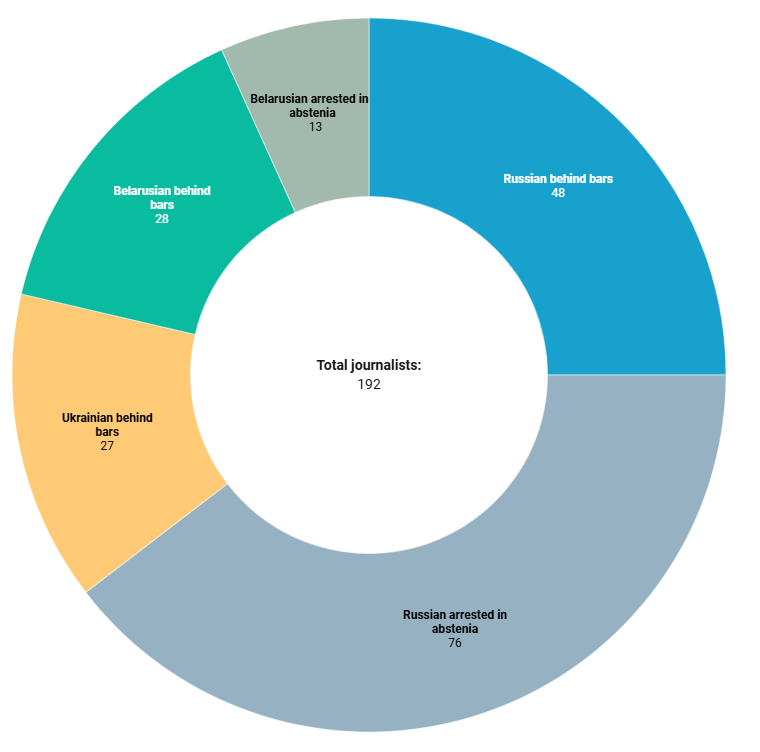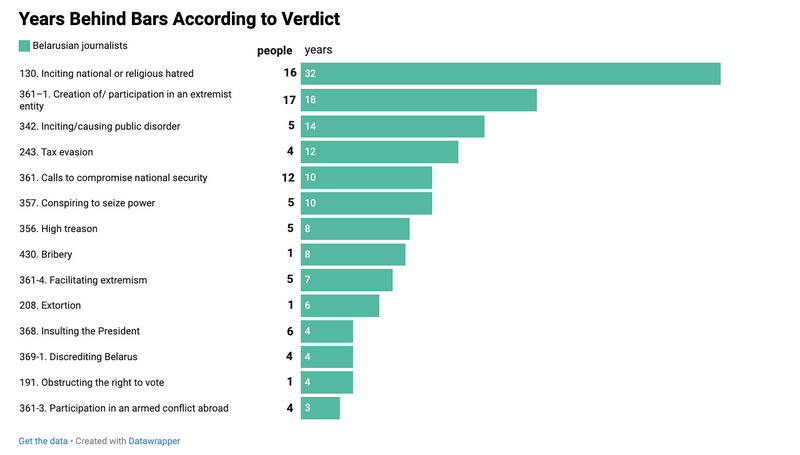Justice for Journalists: Over 100 Media Workers Behind Bars in Russia and Belarus; 89 Arrested in Absentia
On the eve of the International Day to End Impunity for Crimes Against Journalists, the grim statistics sees 103 media workers in Russian and Belarusian prisons and penal colonies. Their combined sentence is over 740 years.

“Dissemination of fakes against the Russian army”, “propaganda of terrorism” and “participation in a terrorist organisation” are the Criminal Code articles most frequently used against the Russian journalists.
Among the incarcerated Russian journalists, the longest sentences were given to:
- Ivan Safronov, Kommersant – 22 years for “high treason”;
- Abdulmumin Gadzhiev, Chernovik – 17 years for “financing terrorism” and “creation of an extremist entity”;
- Felix Eliseev, Telegram channel “Kolkhoz Madness” admin – 14 years for “high treason” and “propaganda of terrorism”.
— I know very well how my colleagues behind bars wake up every morning and can’t believe they are in prison. I feel the pain of their loved ones who are desperately waiting for a letter or a phone call. Their health is getting worse. Journalists shouldn’t be detained for their work. It’s wrong. We must demand their immediate release, — Alsu Kurmasheva, journalist who gained freedom via the prisoners’ swap in November 2024, Press Freedom Advocate at RFE/RL, National Press Club member.
Out of the 75 journalists imprisoned in Russia, 27 are Ukrainian media workers from Crimea, Kherson and Zaporizhzhia regions sentenced to decades in prison on charges including “participation in a terrorist organisation”, “high treason” and “sabotage”.
On 23 October 2025, Yana Suvorova, a 21-year-old administrator of the Telegram channel Melitopol tse Ukraina, was sentenced by a court in Rostov-on-Don, Russia to 14 years in prison. On 2 September, RIA-Melitopol journalist Heorhiy Levchenko received 16 years, while Vladyslav Hershon (Telegram channel Melitopol tse Ukraina) was sentenced to 15 years. Crimean media workers Remzi Bekirov, Dmytro Shtyblykov and Marlen Asanov have earlier received the longest prison sentences of over 19 years each. The charges against these Ukrainian media workers include “high treason”, “sabotage”, “espionage”, “extremism”, and “terrorism”.

— We have a special concern for our colleagues who were taken captive by Russia in the newly occupied territories after the full-scale invasion. These journalists have been deprived not only of their freedom, but also of their basic human rights – including the right to communicate with their families or receive legal assistance. Russia’s actions represent a grave violation of international humanitarian law, and we call on the global community to intensify efforts to secure their release.”
Sergiy Tomilenko, President of the National Union of Journalists of Ukraine; Member of the Steering Committee of the European Federation of Journalists
Out of those media workers who fled Russia after 24 February 2022, 76 media workers are wanted and/or arrested in absentia, with 36 prison sentences already imposed by the Russian courts. At least 20 journalists have been convicted in absentia for “dissemination of fakes against the Russian army” for sentences ranging from five to 11 years.
The “foreign agents” designation criminalises media workers abroad and severely limits their civil rights, including the ability to participate in elections, work in public office, engage in educational activities, organise public events, create any content for minors, advertise their work, etc.
The crackdown is not limited to Russian nationals. At least seven journalists from the UK, Italy, Germany, France, Ukraine, and Romania have been accused of “illegally crossing the state border” for reporting from the Sudzha area of the Kursk region, then under Ukrainian control.

Source: Justice for Journalists Foundation
In Belarus, 28 media workers are currently serving prison sentences ranging from three to 14 years. In September 2025, Ihar IIyash was sentenced to four years in prison for “discrediting Belarus” and “facilitating extremist activities.” His wife, Belsat journalist Katsiaryna Andreyeva (Bakhvalava), has been behind bars since 2020. She was initially sentenced to two years, but was given an additional eight-year sentence on charges of “high treason”, which the Supreme Court later reclassified as “espionage”.

Source: Justice for Journalists Foundation
This year, 15 journalists were released by Akeksandr Lukashenka for political reasons. However, according to Andrei Bastunets, Chairperson of the Belarusian Association of Journalists, they were“…effectively deported from the country along with other freed political prisoners on unclear legal grounds and without any documents or explanations.” Thus, the enforced exile has become yet another method of elimination of independent journalism from inside the country.
“More than 30 media professionals remain behind bars in the country (not including bloggers). Several colleagues are awaiting trial, and new criminal cases continue to be opened — not only against those still in Belarus, but also against those abroad. Such cases are initiated under the so-called “special proceedings” — that is, without the participation of the accused, and often without even notifying them that criminal charges have been filed. The authorities are putting pressure on the relatives of both imprisoned journalists and those who have left the country aiming to restrict the information about the repressions inside Belarus and to force journalists into self-censorship.”
Andrei Bastunets, Chairperson of the Belarusian Association of Journalists

Andrei Bastunets, source: BAJ
In Belarus, at least 13 media workers are arrested in absentia for up to 20 years cumulatively. Among the most widespread criminal articles are “organisation of mass riots” and “harming national security”. According to Andrei Bastunets, “at least 63 more cases against media workers are currently under investigation. We often learn of these cases through the Russian Federation’s wanted persons database: Belarusian journalists are being sought in Russia as well, under a cooperation agreement between the security services of the two countries.”
Both in Russia and Belarus, in addition to criminal prosecution, media workers are routinely added to official “terrorists” and “extremists” registers. This designation blocks their access to bank accounts, restricts property and financial transactions, and hinders international travel. In Belarus, it also leads to the confiscation of property.
On the International Day to End Impunity for Crimes Against Journalists, the Justice for Journalists Foundation, together with representatives of independent media from Belarus, Russia and Ukraine, calls for the freedom of all journalists imprisoned for their professional activities and for strengthening global safeguarding mechanisms to protect media freedom.
 @bajmedia
@bajmedia
